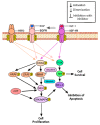Current Molecular-Targeted Therapies in NSCLC and Their Mechanism of Resistance
- PMID: 29973561
- PMCID: PMC6071023
- DOI: 10.3390/cancers10070224
Current Molecular-Targeted Therapies in NSCLC and Their Mechanism of Resistance
Abstract
Lung cancer is treated with many conventional therapies, such as surgery, radiation, and chemotherapy. However, these therapies have multiple undesirable side effects. To bypass the side effects elicited by these conventional treatments, molecularly-targeted therapies are currently in use or under development. Current molecularly-targeted therapies effectively target specific biomarkers, which are commonly overexpressed in lung cancers and can cause increased tumorigenicity. Unfortunately, several molecularly-targeted therapies are associated with initial dramatic responses followed by acquired resistance due to spontaneous mutations or activation of signaling pathways. Acquired resistance to molecularly targeted therapies presents a major clinical challenge in the treatment of lung cancer. Therefore, to address this clinical challenge and to improve lung cancer patient prognosis, we need to understand the mechanism of acquired resistance to current therapies and develop additional novel therapies. This review concentrates on various lung cancer biomarkers, including EGFR, ALK, and BRAF, as well as their potential mechanisms of drug resistance.
Keywords: TKI; inhibitor; lung cancer; molecularly-targeted therapies; resistance.
Conflict of interest statement
The authors declare no conflict of interest.
Figures



References
-
- Kratzke R., Franklin M.J. Lung cancer epidemiology. In: Schwab M., editor. Encyclopedia of Cancer. Springer; Berlin/Heidelberg, Germany: 2016. pp. 1–8.
-
- Domvri K., Zarogoulidis P., Darwiche K., Browning R.F., Li Q., Turner J.F., Kioumis I., Spyratos D., Porpodis K., Papaiwannou A., et al. Molecular targeted drugs and biomarkers in NSCLC, the evolving role of individualized therapy. J. Cancer. 2013;4:736–754. doi: 10.7150/jca.7734. - DOI - PMC - PubMed
Publication types
LinkOut - more resources
Full Text Sources
Other Literature Sources
Medical
Research Materials
Miscellaneous

